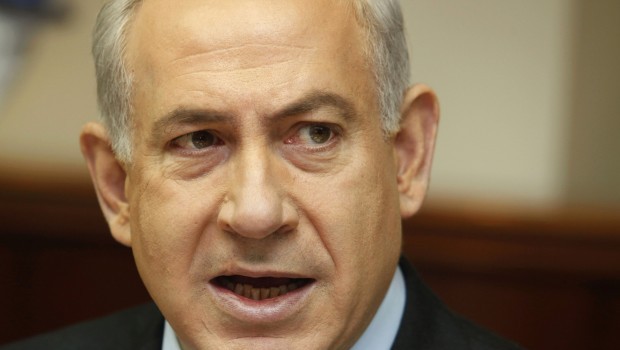
In this Dec. 16, 2012 file photo, Israeli Prime Minister Benjamin Netanyahu attends the weekly cabinet meeting in his Jerusalem office. (AP Photo/Gali Tibbon, Pool, File)
Tel Aviv, Asharq Al-Awsat—Israeli Prime Minister Benjamin Netanyahu gave a cool reception to an apparent softening in the 2002 Arab Peace Initiative, although the amendment had been welcomed in other Arab and Israeli quarters. Israeli media outlets reported that Netanyahu fears that US Secretary of State John Kerry will accept the principal of territorial exchanges in any future deal.
The original Arab League proposal offered full recognition of Israel but only if Tel Aviv gave up all land seized in the 1967 Middle East war and accepted a “just solution” for Palestinian refugees. However the Arab League has accepted the amendment of this peace plan after Qatari Prime Minister Sheikh Hamad bin Jassim Al-Thani raised the possibility of land swaps in setting borders between the Jewish state and an independent Palestine.
Following a meeting with Kerry, Al-Thani told reporters: “The Arab League’s delegation affirmed that agreement should be based on a two-state solution on the basis of the 4th of June 1967 line, with the (possibility) of comparable and mutual agreed minor land swaps.”
This traction on the 2002 peace plan, which had been swiftly rejected by the Israelis at the time, was welcomed by a number of Israeli leaders. Justice Minister Tzipi Livni expressed hopes that this move would restart the frozen peace process.
“This is in the interest of Israel, the interest of the Palestinians, and the interest of the international community,” she added.
Former Israeli Interior Minister, Meir Sheetrit, told Israeli Radio: “There has been mist covering the eyes of the Israeli leadership over the past ten years regarding the Arab Peace Initiative and the positive responses to the peace process this created in the Arab world.”
He said: “At one time, the Arabs were famed for saying ‘No’ and I still recall the decisions taken by the Arab Summit in Khartoum and those three Nos. However something changed for the Arabs and in 2002 they came out with an excellent peace initiative based on establishing a comprehensive peace between Israel and all Arab states in return for Israel withdrawing from the territories occupied in the 1967 war. Following this, 56 Islamic states joined the initiative.”
“Today, we receive an important amendment regarding land swaps, which means that the position of the Arabs towards the peace process is developing. But what are we doing? We are stalling and stuttering and running away,” he added.
Sheetrit revealed that he had privately urged Israel’s last three prime ministers, Ariel Sharon, Ehud Olmert, and Benjamin Netanyahu, to accept the Arab Peace Initiative as a starting point for further negotiations.
He said, “I told them that this initiative dealt with all the conditions with wisdom and intelligence, even putting forward a realistic solution towards the issue of Palestinian refugees’ right of return.”
“I fear that Netanyahu will waste the opportunity to reach a settlement today,” he added.
Israeli Foreign Ministry spokesman Yigal Palmor told Asharq Al-Awsat yesterday that Qatari Prime Minister Sheikh Hamad bin Jassim Al-Thani’s statements were positive, but noted that “the issue of land swaps is not new, and former Palestinian President Yasser Arafat agreed to this in his negotiations with the Ehud Barak government in 2000. The current Palestinian President [Mahmoud Abbas] also agreed to this in his negotiations with Ehud Olmert.”
“What is new is that the Arab League adopted this. This is important, but it represents a small step in the right direction. We must take additional steps until we reach direct negotiations. Only through direct negotiations can we progress towards reaching a settlement,” he added.
Yet Israel’s Haaretz newspaper reported on Thursday that “Prime Minister Benjamin Netanyahu and his aides fear that US Secretary of State John Kerry will accept the Arab League definition of the borders for a Palestinian state and the principal of territorial exchanges.”
The report quoted an unnamed source who claimed that “the prime minister’s advisers are not keen about the Arab League’s announcement.”
“Netanyahu and his advisers believe it would have been better had this announcement not been made,” the source added.
The source revealed that while Netanyahu and his aides acknowledge that the Arab League’s proposal contains some positive aspects, such as the desire to renew the peace process, they believe that the disadvantages outweigh any potential opportunities.
Responding to the revamped peace deal, Netanyahu stressed that “the root of the conflict isn’t territorial. It began way before 1967.”
Speaking to Israeli diplomats on Wednesday, the Israeli Prime Minister said: “The Palestinians’ failure to accept the state of Israel as the nation-state of the Jewish people is the root of the conflict. If we reach a peace agreement, I want to know that the conflict won’t continue—that the Palestinians won’t come later with more demands.”
